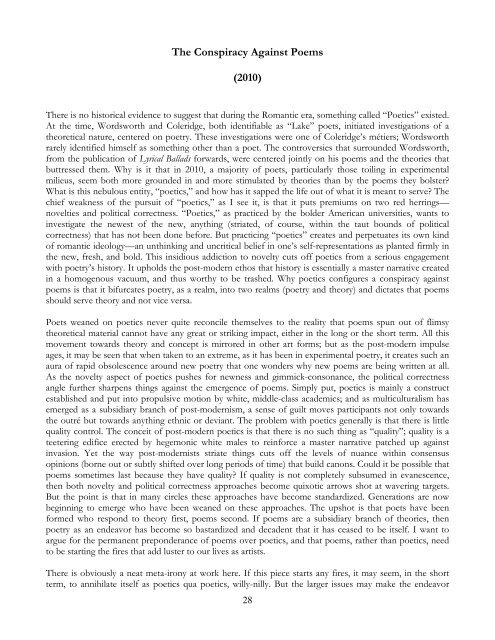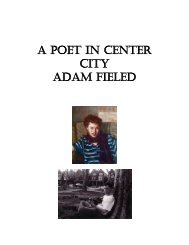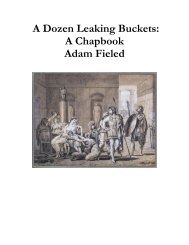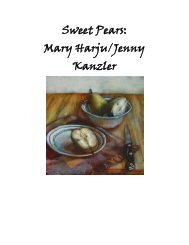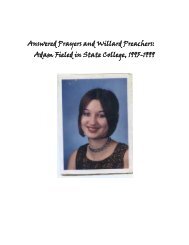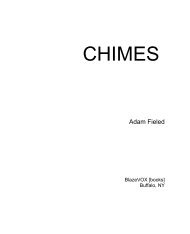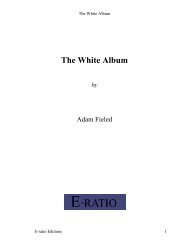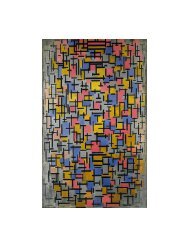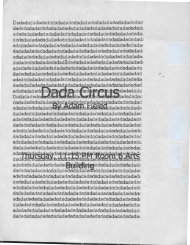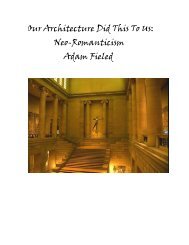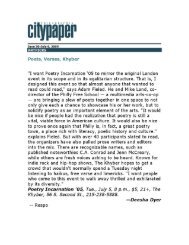3 E-Books: The Argotist Online
These three Adam Fieled collections, The Posit Trilogy, Mother Earth, and Disturb the Universe: The Collected Essays of Adam Fieled, were released in e-book form by The Argotist Online, in 2017, 2011, and 2010, respectively.
These three Adam Fieled collections, The Posit Trilogy, Mother Earth, and Disturb the Universe: The Collected Essays of Adam Fieled, were released in e-book form by The Argotist Online, in 2017, 2011, and 2010, respectively.
You also want an ePaper? Increase the reach of your titles
YUMPU automatically turns print PDFs into web optimized ePapers that Google loves.
<strong>The</strong> Conspiracy Against Poems<br />
(2010)<br />
<strong>The</strong>re is no historical evidence to suggest that during the Romantic era, something called “Poetics” existed.<br />
At the time, Wordsworth and Coleridge, both identifiable as “Lake” poets, initiated investigations of a<br />
theoretical nature, centered on poetry. <strong>The</strong>se investigations were one of Coleridge’s métiers; Wordsworth<br />
rarely identified himself as something other than a poet. <strong>The</strong> controversies that surrounded Wordsworth,<br />
from the publication of Lyrical Ballads forwards, were centered jointly on his poems and the theories that<br />
buttressed them. Why is it that in 2010, a majority of poets, particularly those toiling in experimental<br />
milieus, seem both more grounded in and more stimulated by theories than by the poems they bolster?<br />
What is this nebulous entity, “poetics,” and how has it sapped the life out of what it is meant to serve? <strong>The</strong><br />
chief weakness of the pursuit of “poetics,” as I see it, is that it puts premiums on two red herrings—<br />
novelties and political correctness. “Poetics,” as practiced by the bolder American universities, wants to<br />
investigate the newest of the new, anything (striated, of course, within the taut bounds of political<br />
correctness) that has not been done before. But practicing “poetics” creates and perpetuates its own kind<br />
of romantic ideology—an unthinking and uncritical belief in one’s self-representations as planted firmly in<br />
the new, fresh, and bold. This insidious addiction to novelty cuts off poetics from a serious engagement<br />
with poetry’s history. It upholds the post-modern ethos that history is essentially a master narrative created<br />
in a homogenous vacuum, and thus worthy to be trashed. Why poetics configures a conspiracy against<br />
poems is that it bifurcates poetry, as a realm, into two realms (poetry and theory) and dictates that poems<br />
should serve theory and not vice versa.<br />
Poets weaned on poetics never quite reconcile themselves to the reality that poems spun out of flimsy<br />
theoretical material cannot have any great or striking impact, either in the long or the short term. All this<br />
movement towards theory and concept is mirrored in other art forms; but as the post-modern impulse<br />
ages, it may be seen that when taken to an extreme, as it has been in experimental poetry, it creates such an<br />
aura of rapid obsolescence around new poetry that one wonders why new poems are being written at all.<br />
As the novelty aspect of poetics pushes for newness and gimmick-consonance, the political correctness<br />
angle further sharpens things against the emergence of poems. Simply put, poetics is mainly a construct<br />
established and put into propulsive motion by white, middle-class academics; and as multiculturalism has<br />
emerged as a subsidiary branch of post-modernism, a sense of guilt moves participants not only towards<br />
the outré but towards anything ethnic or deviant. <strong>The</strong> problem with poetics generally is that there is little<br />
quality control. <strong>The</strong> conceit of post-modern poetics is that there is no such thing as “quality”; quality is a<br />
teetering edifice erected by hegemonic white males to reinforce a master narrative patched up against<br />
invasion. Yet the way post-modernists striate things cuts off the levels of nuance within consensus<br />
opinions (borne out or subtly shifted over long periods of time) that build canons. Could it be possible that<br />
poems sometimes last because they have quality? If quality is not completely subsumed in evanescence,<br />
then both novelty and political correctness approaches become quixotic arrows shot at wavering targets.<br />
But the point is that in many circles these approaches have become standardized. Generations are now<br />
beginning to emerge who have been weaned on these approaches. <strong>The</strong> upshot is that poets have been<br />
formed who respond to theory first, poems second. If poems are a subsidiary branch of theories, then<br />
poetry as an endeavor has become so bastardized and decadent that it has ceased to be itself. I want to<br />
argue for the permanent preponderance of poems over poetics, and that poems, rather than poetics, need<br />
to be starting the fires that add luster to our lives as artists.<br />
<strong>The</strong>re is obviously a neat meta-irony at work here. If this piece starts any fires, it may seem, in the short<br />
term, to annihilate itself as poetics qua poetics, willy-nilly. But the larger issues may make the endeavor<br />
28


